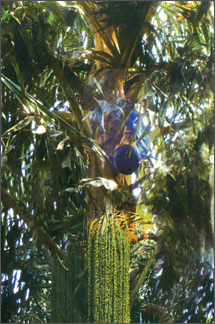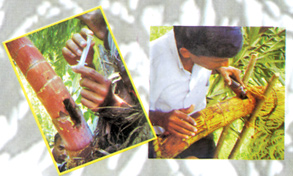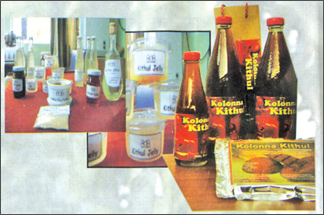Attitude change vital to make kithul a lucrative industry
by Lalin FERNANDOPULLE
Kithul manufacture, a perennial cottage industry is now turned into a
commercially viable export industry under the National Kithul
Development Program of the Ministry of Rural Industries and Self
Employment Promotion.

 |
|
Application of KASPER |
 |
|
Kithul products |
The program was launched early this year following a Cabinet approval
to spearhead a vibrant export market and promote self employment at
rural level.
Additional Secretary to the Ministry of Rural Industries and Self
Employment Promotion, K.R. Samarasingha said new technology and a market
has been secured to revive the industry which had been dormant due to
the absence of a proper program.
"New cooking and preserving techniques and facilities to uplift the
industry have been introduced to encourage manufacturers", he said. The
objective of the national program is to go beyond the cottage industry
to a commercial venture that would generate employment and develop the
rural economy.
Samarasinghe said that according to a survey a sum of Rs. 10,000 to
Rs. 20,000 could be earned a month from a kithul tree by producing
treacle and jaggery.The profit could be enhanced depending on the
maturity of the tree and the weather condition.
Kithul is predominantly found in the wet zone and according to the
Agrarian Development and Department of Census and Statistics the country
has around three million kithul trees grown in the Ratnapura, Kandy,
Matale, Badulla and as fragments in the Anuradhapura and Polonnaruwa
districts. The study further disclosed that of the three million trees
it is only around 550,000 trees that are in the stage of blooming and
suitable for tapping. It has been ascertained that around 30,000 people
are engaged in the kithul industry.
Samarasinghe said the kithul tree is a herbal crop and it is a better
alternative to sugar as a nutritious food product that could save the
drain of large amounts of foreign exchange on the import of sugar.
According to a Central Bank report the country spend around Rs. 22,000
million last year on the import of around 575,000 mt of sugar. Annually
around 550,000 mt of sugar is imported.
There is a great demand for quality kithul products from the local
and overseas markets. Kithal flour, treacle, jaggery, syrups, jelly and
toddy are some of the products of the kithul tree.
Kithul Activation and Sap Production Enhancing Reagent (KASPER), a
treatment to promote toddy harvest was introduced by the Ministry with
the support of the Industrial Technology Institute.
Samarasinghe said steps have been taken to elevate the standard of
kithul producers by registering, issuing identity cards, introducing
pension and insurance schemes. Research to introduce high yielding trees
have commenced.
"Kithul manufacturing pilot projects have been launched in the
Divisional Secretariats of Imbulpe, Passara, Hataraliyadda,
Bulathsinhala, Tawalama and Madulla", he said.
Samarasinghe said that to make kithul a lucrative industry there has
to be a change in attitude. Tapping and manufacture of kithul products
then could be recognised as a profession.
|

